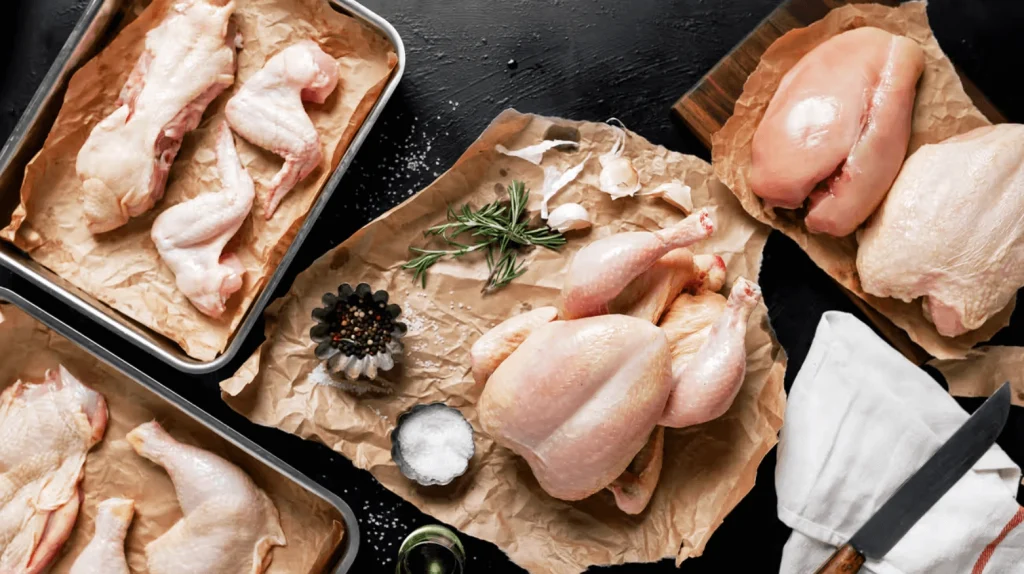Chicken breast is widely regarded as a lean protein powerhouse, ideal for those looking to maintain a healthy diet. Chicken breast nutrition offers a wealth of benefits, including high protein content, essential vitamins, and minimal calories. Is chicken breast good for weight loss or muscle building? Absolutely! With its low-fat profile and high-quality protein, it’s a perfect choice for both weight management and muscle development.

Content
Nutritional Breakdown of Chicken Breast
When considering the nutritional value of chicken breast, one of the first things to note is its low-calorie count compared to other cuts of meat. For example, a 100-gram serving of cooked, skinless chicken breast contains around 165 calories, with 31 grams of protein and just 3.6 grams of fat. This makes chicken breast an incredibly nutrient-dense food that can easily fit into various diets, especially those focused on weight loss or muscle-building goals.
Macronutrients in Chicken Breast
The macronutrients in chicken breast—protein, fat, and carbohydrates—make it an excellent food choice for anyone focused on health. Chicken breast is primarily composed of protein, which is essential for building and repairing muscles. Each serving provides high-quality protein, which is also crucial for keeping you full and satisfied.
Protein per 100 grams of chicken breast stands at approximately 31 grams, a significant amount compared to other protein sources like beef or pork. The low fat content (3.6 grams per 100g) makes it a suitable choice for calorie-conscious individuals, while its negligible carbohydrate content helps it fit into low-carb or keto diets.
Protein Content in Chicken Breast
One of the most notable features of chicken breast nutrition is its rich protein content. For those seeking to increase their protein intake, particularly in the context of bodybuilding, chicken breast is a go-to food. A 100-gram serving provides an impressive 31 grams of protein, making it one of the highest protein-rich cuts of meat.
How Much Protein Does Chicken Breast Contain?
As mentioned, chicken breast protein per 100g is around 31 grams, which is considered an ideal amount for muscle growth, repair, and overall health. This makes it a staple for athletes, bodybuilders, and anyone looking to add more protein to their diet. To put this into perspective, chicken breast contains more protein per 100 grams than many other meats, including beef and pork.
For those following a specific fitness regime, such as weightlifting or running, chicken breast serves as an optimal protein source due to its low fat and high bioavailability—meaning your body can absorb and utilize the protein more effectively.
Calorie Count of Chicken Breast (Raw vs. Cooked)
Another essential aspect of chicken breast nutrition is the difference in calorie content between raw and cooked forms. Raw chicken breast typically contains fewer calories than its cooked counterpart because the cooking process causes the meat to lose water, which concentrates the nutrients.
For example, 100 grams of raw chicken breast contain about 120 calories, while the same amount after cooking (grilled, baked, or pan-fried) can contain up to 165 calories. The method of preparation, such as grilling or baking, helps preserve nutrients while keeping the calorie count relatively low.
Cooking Methods and Nutritional Variations
How you prepare your chicken breast also affects its nutritional profile. Grilled chicken breast nutrition tends to be a favorite for health-conscious individuals, as grilling allows excess fat to drain away, resulting in a leaner meal. Baked chicken breast is also a healthy option, but frying can increase calorie content due to the oil used.
In general, when preparing chicken breast for weight loss or muscle gain, it’s important to choose cooking methods that don’t add unnecessary calories, such as grilling, baking, or steaming.
Benefits of Chicken Breast for Weight Loss and Muscle Building
Chicken breast is often hailed as one of the best protein sources for those focused on weight loss and muscle building. This is because of its excellent balance of protein to fat. For anyone trying to shed excess pounds, chicken breast is an ideal food choice because it provides high-quality protein without a large calorie load.
High Protein, Low Fat
The low fat content of chicken breast makes it suitable for anyone on a calorie-restricted diet. With its high protein content, it helps increase satiety, preventing overeating while also promoting fat loss. Chicken breast nutrition for bodybuilding is similarly impressive, as protein is essential for muscle recovery and growth after intense workouts.
For keto diets, chicken breast is also a popular option due to its minimal carbohydrate content. By incorporating it into meals, you can maintain a high protein intake without worrying about the carbs that come with other meats like pork or beef.
Comparing Chicken Breast to Other Chicken Cuts
When comparing chicken breast to other cuts, it’s clear that chicken breast stands out as the leanest option. Cuts like chicken thighs, wings, and legs provide a higher fat content, which can be beneficial depending on your dietary goals.
- Chicken Thigh Nutrition: A 100-gram serving of chicken thighs contains around 200 calories, with 26 grams of protein and 8 grams of fat. While still an excellent protein source, it is higher in fat than chicken breast, making it less suitable for low-fat or calorie-conscious diets.
- Chicken Wing Nutrition: Chicken wings, on the other hand, are even fattier, with up to 43 grams of fat per 100 grams (when fried). However, they are often enjoyed for their flavor and can be part of a balanced diet if consumed in moderation.
- Chicken Leg Nutrition: Like chicken thighs, chicken legs are a fattier option, with roughly 10 grams of fat per 100 grams. They are flavorful and can be enjoyed as part of a well-rounded diet but may not be ideal for those strictly monitoring fat intake.
In comparison, chicken breast remains the top choice for those seeking lean, high-protein meat with minimal fat.
Maximizing the Nutritional Value of Chicken Breast
While chicken breast nutrition is naturally healthy, it’s essential to cook it properly to retain its nutrients. Overcooking can lead to nutrient loss, especially when exposed to high temperatures for long periods.
Best Ways to Cook Chicken Breast
To keep your chicken breast nutritious:
- Grill or bake your chicken to preserve its lean protein.
- Avoid frying, as this can add unnecessary fats and calories.
- Marinate the chicken in herbs, olive oil, or vinegar to enhance flavor without adding unhealthy fats.
Additionally, pairing chicken breast with vegetables, whole grains, and healthy fats will create a balanced, nutrient-rich meal that supports your health and fitness goals.
Conclusion
Chicken breast is an incredibly versatile and nutrient-dense food, offering a wealth of benefits for anyone seeking to improve their diet. Whether you’re focused on weight loss, bodybuilding, or maintaining a balanced, healthy diet, chicken breast nutrition is an essential part of your meal planning. With its high protein content, low-fat profile, and abundance of vitamins and minerals, it’s no wonder chicken breast remains a favorite for health-conscious individuals worldwide.
Frequently Asked Questions about Chicken Breast Nutrition Facts
Is chicken breast healthier than thighs?
Yes, chicken breast is lower in fat and calories compared to chicken thighs, making it a better choice for weight loss and lean muscle gain. However, thighs offer a richer taste and more fat, which can be beneficial for certain diets.
Can chicken breast be eaten every day?
Absolutely! As long as it’s part of a balanced diet, chicken breast nutrition is healthy enough to be consumed daily. Just ensure you’re varying your food choices to include other protein sources for optimal nutrition.
What’s the best way to cook chicken breast for weight loss?
The healthiest cooking methods are grilling, baking, or steaming chicken breast. Avoid frying, as this increases the calorie content significantly.

Karen is a health blog author who has been writing about healthy living since 2013. She started her journey by adopting a vegan diet and eating only organic foods, but the more she learned, the more she realized that we should all be eating plant-based diets exclusively. As an expert in nutrition and wellness, Karen blogs to educate readers on how they can live happier and healthier lives through food choices!


